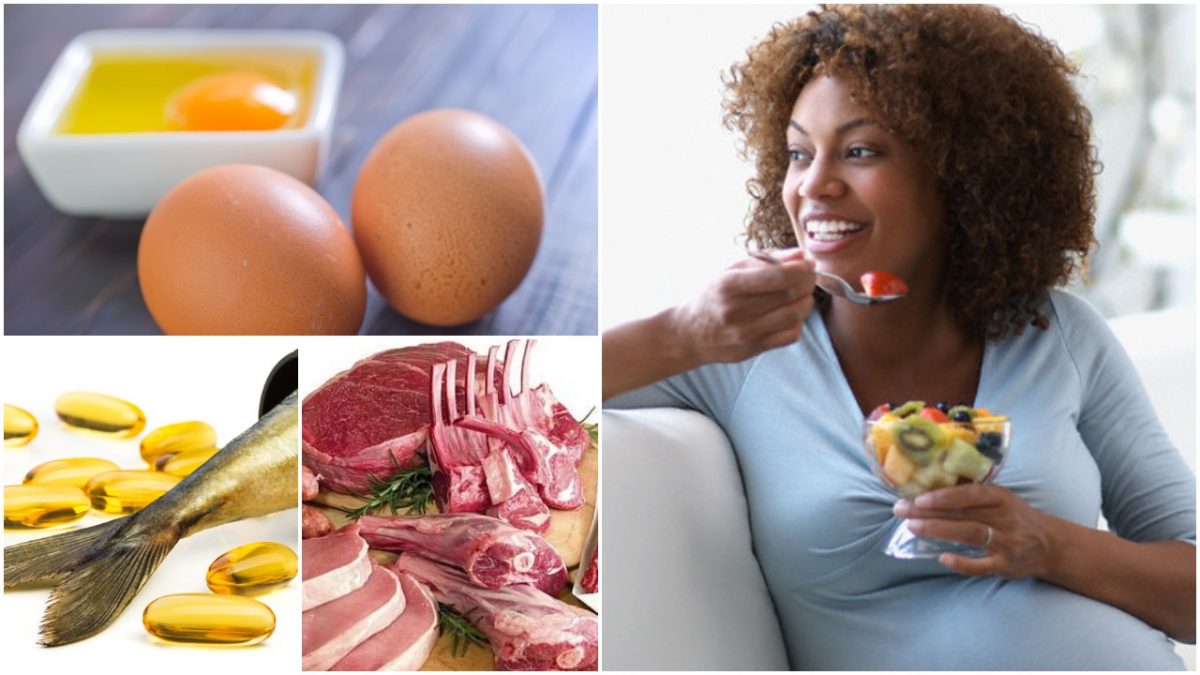
9 Types Of Food You Should Eat When Pregnant
- Funmilola
- April 26, 2018
- Living
- A Guide To The Types Of Food You Should Eat When Pregnant, Berries, Diary Products, Eggs, Fish Liver Oil, Legumes, Nigerian Pregnant Women And Food, Sweet Potatoes, Types Of Foods Nigerian Pregnant Women Should Eat | Photos, Whole Grains
- 0 Comments

Being pregnant is hardly ever easy for any woman. Ranging from the bloated face and swollen legs to uncomfortable sleeping positions down to eating the right kind of meals.
In all of this, eating the right kind of meals is the most sensitive as whatever you get to eat may affect your unborn baby. Remember eating while pregnant equates to eating for two.
Maintaining a healthy diet during pregnancy is very essential because at this time, your body needs additional nutrients, vitamins and minerals.

This article will give you an insight on the kinds of meals you can eat when you are pregnant.
1. Diary Products

During pregnancy, you need to consume extra protein and calcium to meet the needs of the growing fetus.
Dairy products contain two types of high quality protein: casein and whey. Dairy is the best dietary source of calcium, and provides high amounts of phosphorus, various B-vitamins, magnesium and zinc.
Yogurt, especially Greek yogurt, is particularly beneficial for pregnant women.
Dairy products help meet increased protein and calcium needs.
2. Legumes

These includes lentils, peas, beans, chickpeas, soybeans and peanuts.
Legumes are excellent plant-based sources of fiber, protein, iron, folate (B9) and calcium, all of which the body needs more of during pregnancy.
Folate is one of the B-vitamins (B9). It is very important for the health of the mother and fetus, especially during the first trimester. It may reduce the risk of some birth defects and diseases.
3. Sweet Potatoes

Sweet potatoes are very rich in beta-carotene, a plant compound that is converted into vitamin A in the body. Vitamin A is essential for growth, as well as for the differentiation of most cells and tissues. It is very important for healthy fetal development
However, they are also advised to avoid very high amounts of animal-based sources of vitamin A, which may cause toxicity when eaten in excess.
Therefore, beta-carotene is a very important source of vitamin A for pregnant women.
Furthermore, sweet potatoes contain fiber, which may increase fullness, reduce blood sugar spikes and improve digestive health and mobility.
4. Eggs

Eggs are the ultimate health food, because they contain a little bit of almost every nutrient you need.
A large egg contains 77 calories, as well as high-quality protein and fat. It also contains many vitamins and minerals.
Eggs are a great source of choline. Choline is essential for many processes in the body, including brain development and health.
Low choline intake during pregnancy may increase the risk of neural tube defects and possibly lead to decreased brain function.
A single whole egg contains roughly 113 mg of choline, which is about 25% of the recommended daily intake for pregnant women (450 mg).
5. Fish Liver Oil

Fish liver oil is made from the oily liver of fish, most often cod.
The oil is very rich in the omega-3 fatty acids EPA and DHA, which are essential for fetal brain and eye development.
Fish liver oil is also very high in vitamin D, which many people do not get enough of. It may be highly beneficial for those who don’t regularly eat seafood or supplement with omega-3 or vitamin D.
Low vitamin D intake intake has been linked with an increased risk of preeclampsia. This potentially dangerous complication is characterized by high blood pressure, swelling of the hands and feet, and protein in the urine.
Consuming cod liver oil during early pregnancy has been linked with higher birth weight and a lower risk of disease later in the baby’s life.
6. Berries

Berries are packed with water, healthy carbs, vitamin C, fiber and plant compounds. They generally contain high amounts of vitamin C, which helps the body absorb iron.
Vitamin C is also important for skin health and immune function. Berries have a relatively low glycemic index value, so they should not cause major spikes in blood sugar.
Berries are also a great snack because they contain both water and fiber. They provide a lot of flavor and nutrition, but with relatively few calories.
7. Whole Grains

Whole grains are an important source of energy in the diet, and they also provide fiber, iron and B-vitamins.
At least half of a pregnant woman’s carbohydrate choices each day should come from whole grains, such as oatmeal, whole-wheat pasta or breads and brown rice.
8. Vegetables

Green vegetables, such as spinach, broccoli, spinach contain many of the nutrients that pregnant women need.
These include fiber, vitamin C, vitamin K, vitamin A, calcium, iron, folate and potassium.
Furthermore, leafy greens are rich in antioxidants. They also contain plant compounds that benefit the immune system and digestion.
Due to their high fiber content, these vegetables may also help prevent constipation. This is a very common problem among pregnant women.
Consuming green, leafy vegetables has also been linked with a reduced risk of low birth weight.
9. Lean Meat

Beef, pork and chicken are excellent sources of high-quality protein.
Furthermore, beef and pork are also rich in iron, choline and other B-vitamins — all of which are needed in higher amounts during pregnancy.
Iron is an essential mineral that is used by red blood cells as a part of hemoglobin. It is important for delivering oxygen to all cells in the body.
Pregnant women need more iron, since their blood volume is increasing. This is particularly important during the third trimester.
Your daily iron needs double during pregnancy, so it’s important to include plenty of iron-rich foods now. “






